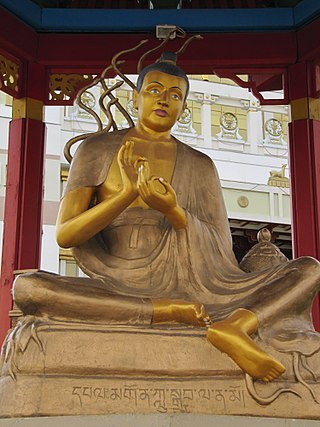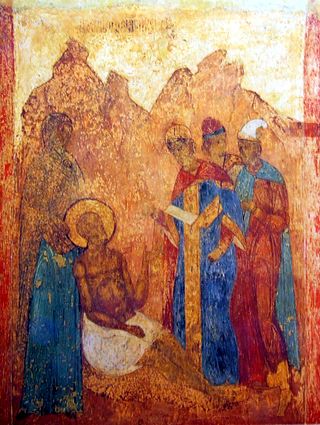
The Book of Job, or simply Job, is a book found in the Ketuvim ("Writings") section of the Hebrew Bible (Tanakh), and is the first of the Poetic Books in the Old Testament of the Christian Bible. Scholars are generally agreed that it was written between the 7th and 4th centuries BCE. It addresses theodicy, why God permits evil in the world, through the experiences of the eponymous protagonist. Job is a wealthy and God-fearing man with a comfortable life and a large family; God, having asked Satan for his opinion of Job's piety, decides to take away Job's wealth, family and material comforts, following Satan's accusation that if Job were rendered penniless and without his family, he would turn away from God.

The Book of Proverbs is a book in the third section of the Hebrew Bible and a book of the Christian Old Testament. When translated into Greek and Latin, the title took on different forms: in the Greek Septuagint (LXX) it became Παροιμίαι ; in the Latin Vulgate the title was Proverbia, from which the English name is derived.

Wisdom, sapience, or sagacity is the ability to contemplate and act productively using knowledge, experience, understanding, common sense and insight. Wisdom is associated with attributes such as unbiased judgment, compassion, experiential self-knowledge, self-transcendence and non-attachment, and virtues such as ethics and benevolence.

Fritjof Capra is an Austrian-born American physicist, systems theorist and deep ecologist. In 1995, he became a founding director of the Center for Ecoliteracy in Berkeley, California. He is on the faculty of Schumacher College.

Prajñāpāramitā means "the Perfection of Wisdom" or "Transcendental Knowledge" in Mahāyāna and Theravāda Buddhism. Prajñāpāramitā refers to a perfected way of seeing the nature of reality, as well as to a particular body of Mahāyāna scriptures (sūtras) which discusses this wisdom. It also refers to the female deity Prajñāpāramitā Devi, a personification of wisdom also known as the "Great Mother".

Sir Norman Joseph Wisdom, was an English actor, comedian, musician and singer best known for a series of comedy films produced between 1953 and 1966 featuring a hapless onscreen character often called Norman Pitkin. He was awarded the 1953 BAFTA Award for Most Promising Newcomer to Leading Film Roles following the release of Trouble in Store, his first film in a lead role.
Eudaimonia is a Greek word literally translating to the state or condition of 'good spirit', and which is commonly translated as 'happiness' or 'welfare'.
Sophia means "wisdom" in Greek. It may refer to:
The conventional wisdom or received opinion is the body of ideas or explanations generally accepted by the public and/or by experts in a field. In religion, this is known as orthodoxy.

The Diamond Sutra is a Mahāyāna (Buddhist) sutra from the genre of Prajñāpāramitā sutras. Translated into a variety of languages over a broad geographic range, the Diamond Sūtra is one of the most influential Mahayana sutras in East Asia, and it is particularly prominent within the Chan tradition, along with the Heart Sutra.

Mādhyamaka, otherwise known as Śūnyavāda and Niḥsvabhāvavāda, refers to a tradition of Buddhist philosophy and practice founded by the Indian Buddhist monk and philosopher Nāgārjuna. The foundational text of the Mādhyamaka tradition is Nāgārjuna's Mūlamadhyamakakārikā. More broadly, Mādhyamaka also refers to the ultimate nature of phenomena as well as the non-conceptual realization of ultimate reality that is experienced in meditation.
Kevin P. Helliker is an American journalist, formerly a senior writer and editor on the New York sports desk of The Wall Street Journal. After spending over 25-years with the Journal, he joined the Brunswick Group, in February 2017.

Tsongkhapa was an influential Tibetan Buddhist monk, philosopher and tantric yogi, whose activities led to the formation of the Gelug school of Tibetan Buddhism. He is also known by his ordained name Losang Drakpa or simply as "Je Rinpoche". He is also known by Chinese as Zongkapa Lobsang Zhaba or just Zōngkàbā (宗喀巴).

Tunapuna is a town in the East–West Corridor of the island of Trinidad, in Trinidad and Tobago.
In Buddhism, dhamma vicaya has been variously translated as the "analysis of qualities," "discrimination of dhammas," "discrimination of states," "investigation of doctrine," and "searching the Truth." The meaning is ambivalent; it implies the investigation of the Buddhist teachings (dhamma), but also the application of discernment to body-mind phenomena in order to apply right effort, giving way to entry into the first jhana.

Yab-yum is a common symbol in the Tibetan Buddhist art of India, Bhutan, Nepal, and Tibet. It represents the primordial union of wisdom and compassion, depicted as a male deity in union with his female consort through the similar ideas of interpenetration or "coalescence", using the concept of Indra's net to illustrate this. The male figure represents compassion and skillful means, while the female partner represents insight. In yab-yum the female is seated on the male's lap. There is a rare presentation of a similar figure but reversed, with the male sitting on the female's lap, called yum-yab.
The Svātantrika–Prāsaṅgika distinction is a doctrinal distinction made within Tibetan Buddhism between two stances regarding the use of logic and the meaning of conventional truth within the presentation of Madhyamaka.

You in Reverse is the sixth full-length album released by indie rock band Built to Spill. The band added one new member for this album, making Built to Spill a quartet for the first time. It was also the first album since Ultimate Alternative Wavers not recorded or produced by Phil Ek. The lineup was Doug Martsch, Brett Nelson, Scott Plouf, and Jim Roth. The album was recorded in Portland, Oregon at Audible Alchemy. You in Reverse was released on April 11, 2006.

Eliphaz is called a Temanite. He is one of the friends or comforters of Job in the Book of Job in the Hebrew Bible.











